 Petzlover
Petzlover Griffon Fauve de Bretagne is originated from France but Havanese is originated from Cuba. Griffon Fauve de Bretagne may grow 29 cm / 12 inches higher than Havanese. Griffon Fauve de Bretagne may weigh 15 kg / 34 pounds more than Havanese. Griffon Fauve de Bretagne may live 3 years less than Havanese. Griffon Fauve de Bretagne may have less litter size than Havanese. Griffon Fauve de Bretagne requires Moderate Maintenance. But Havanese requires High Maintenance
Griffon Fauve de Bretagne is originated from France but Havanese is originated from Cuba. Griffon Fauve de Bretagne may grow 29 cm / 12 inches higher than Havanese. Griffon Fauve de Bretagne may weigh 15 kg / 34 pounds more than Havanese. Griffon Fauve de Bretagne may live 3 years less than Havanese. Griffon Fauve de Bretagne may have less litter size than Havanese. Griffon Fauve de Bretagne requires Moderate Maintenance. But Havanese requires High Maintenance
 The Griffon Fauve de Bretagne is one of the oldest scenthounds in France and has always been part of a pack when hunting wolves and wild boar.
The Griffon Fauve de Bretagne is one of the oldest scenthounds in France and has always been part of a pack when hunting wolves and wild boar.
Once wolves started dying out in the 19th century and the dogs were no longer needed, they nearly became extinct. Luckily in 1949, Marcel Pambrun founded the Club de Fauve de Bretagne to bring the breed back from extinction.
Hailing from France, the dog is still used as a hunting dog in the country but is considered rare outside of Europe.
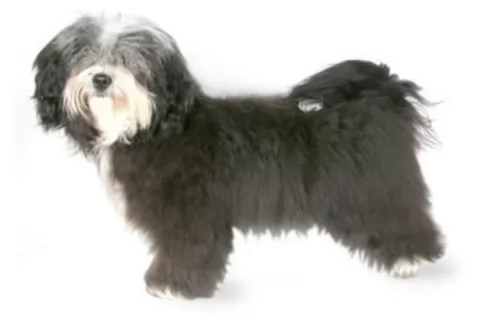 The only breed of dog that is native to Cuba is the Havanese. These little dogs are great companion animals. Sociable and happy, they are very popular in the United States with urbanites. These happy little pups are a Bichon type of dog which was developed from the “Little White Dog of Havana” or the Blanquito de la Habana which is now extinct.
The only breed of dog that is native to Cuba is the Havanese. These little dogs are great companion animals. Sociable and happy, they are very popular in the United States with urbanites. These happy little pups are a Bichon type of dog which was developed from the “Little White Dog of Havana” or the Blanquito de la Habana which is now extinct.
The Blanquito de la Habana was itself developed from another extinct breed the Bichon Tenerife. Then the Blanquito was bred with the other Bichons and poodles in developing the Havanese. It is believed that some of the first people to settle in Cuba were from Tenerife, an island close to Cuba. In the early part of the sixteenth century, little white dogs were brought to Cuba with these settlers. This dog of Tenerife is believed to be the ancestor of all Bichon breeds.
At that time trade with Cuba was highly restricted by the Spanish and so these dogs developed without any crossing from other breeds from outside the country. They grew to be able to stand hot temperatures and they grew a very unique coat – almost like silk. Their coat is soft and light, while insulating them from the tropical environment.
At this time Cuba was the place to be for Europeans aristocrats on vacation. Unlike the British colonies, Cuba had theatres, operas and palacious. When going back to Europe, many took this little white dog with them to France, Spain and England. The Dog of Havannah was a favorite on European soil as well. Many of these dogs taken to Europe were fawn or parti instead of white. Meanwhile back in Cuba, the bourgeoisie were replacing the aristocracy who themselves would soon be replaced by the Revolution.
During the days of the bourgeoisie, the Havanese became very popular household pets. The breed has been a family pet for the last 150 years. At the same time the breed was very trendy in Europe with Charles Dickens and Queen Victoria owning several. They were by now familiar participants in Europe’s dog shows. Finally, with the Revolution, the bourgeoisie left the country in droves with their little white dogs. A genetic pool was then formed in the US. Gene pool from 11 dogs. All the Havanese in the world are descended from those 11 dogs with the exception of the dogs isolated in Cuba and the US. Today the Havanese is one of the most popular and fastest growing breeds in the world.
 Griffon Fauve de Bretagne are medium-sized muscular dogs standing at between 48 to 56cm and weighing in the region of 17 to 21 kg.
Griffon Fauve de Bretagne are medium-sized muscular dogs standing at between 48 to 56cm and weighing in the region of 17 to 21 kg.
The fur of this dog is a tawny, golden, orange shade and is shaggy and coarse, being longer around the face. Known also as the Fawn Brittany Griffon, this scenthound has floppy ears and a long tail carried somewhat up and in a slight curve.
The GFB as he is also sometimes known by, is an affectionate and loyal dog that loves spending time with his human family.
He is a social, friendly dog, and when he is socialized and trained, he becomes even more amicable. He has been bred as a working dog and while he loves to spend relaxing hours indoors, he is essentially a dog that loves to be out and about chasing after prey.
He is alert and intelligent and therefore makes a good watchdog. Your Griffon is energetic and active and will require lots of exercise. He will love coming on walks with you, but this won't be enough and he will require ball- and rope games as well as the chance to join you on your jogging or cycling outings.
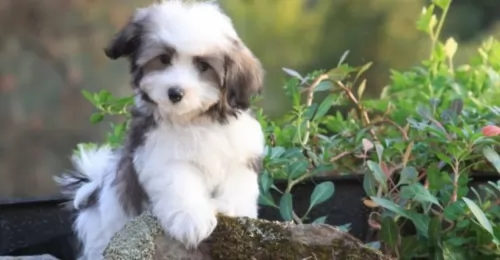 The Havanese is a sturdy little dog, a member of the toy group. They weigh no more than 16 pounds (7.3kg) and his body is longer than it is tall. The breed has a unique topline that is not level, but it is straight. His front legs are longer than his hind legs producing the lively gait everyone is used to seeing with a Havanese. With a full muzzle that tapers to the nose, the Havanese does not seem to be short. The skull’s length is the same as the muzzle’s. The head of the Havanese is round in the back and flat in the front.
The Havanese is a sturdy little dog, a member of the toy group. They weigh no more than 16 pounds (7.3kg) and his body is longer than it is tall. The breed has a unique topline that is not level, but it is straight. His front legs are longer than his hind legs producing the lively gait everyone is used to seeing with a Havanese. With a full muzzle that tapers to the nose, the Havanese does not seem to be short. The skull’s length is the same as the muzzle’s. The head of the Havanese is round in the back and flat in the front.
They have a deep chest, almond shaped eyes that are dark brown and their ears are about halfway down the nose. The long ears hang down the side od the face. They have a long plumed tail that is held high and upward. The standard for the breed and now the laws of the United Kingdom state that there can be no docking of the tail.
 You won't find a better canine friend than the Griffon Fauve de Bretagne, once known as the Grand Fauve de Bretagne.
You won't find a better canine friend than the Griffon Fauve de Bretagne, once known as the Grand Fauve de Bretagne.
They have always loved their role as working- and hunting dog but when they're in the company of their human owners, they are loyal and loving, wanting to please.
This good nature of theirs sees them getting on well with other pets in the home as well as with children.Your golden Griffon Fauve De Bretagne is such a friendly, sociable dog and this is what makes him such a popular and sought after family pet.
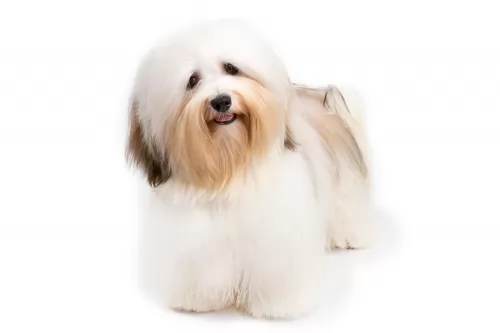 Havanese are highly intelligent and eager to please, and they are easily trained so long as you use only positive methods. This can be a sensitive breed, so care must be taken to not scold them harshly. Socialization from an early age is very important. Expose them calmly to a wide variety of new places and new people, always ensuring that the experiences are positive and not intimidating. Gentle, patient training will result in a wonderful companion dog. They are affectionate with people and get along with other nonaggressive pets.
Havanese are highly intelligent and eager to please, and they are easily trained so long as you use only positive methods. This can be a sensitive breed, so care must be taken to not scold them harshly. Socialization from an early age is very important. Expose them calmly to a wide variety of new places and new people, always ensuring that the experiences are positive and not intimidating. Gentle, patient training will result in a wonderful companion dog. They are affectionate with people and get along with other nonaggressive pets.
The Havanese is the consummate lap dog. Over time they have become the lovable family companion.
The breed is pretty adaptable being able to live as a companion animal in almost any setting. Just don’t expect your Havanese to go hiking or romp with you on 40 acres in the country.
They are intelligent, love to learn but can be a little stubborn. Train them early as they like their habits and its much harder to train an older Havanese.
 Capable of reaching 10 to 13 years of age with good care, the Griffon Fauve de Bretagne isn't likely to cause you too much concern with dog illnesses, but there are those common dog illnesses that are worth knowing about because they affect so many dogs.
Capable of reaching 10 to 13 years of age with good care, the Griffon Fauve de Bretagne isn't likely to cause you too much concern with dog illnesses, but there are those common dog illnesses that are worth knowing about because they affect so many dogs.
This is such a common dog ailment that it requires mentioning every time. It's a condition where the hip joint bones don't fit properly, resulting in unnatural wear and tear which ultimately leads to pain and arthritis.
Sometimes it takes a while for the illness to become evident and you'll notice your pet being loathe to take part in the games he loves so much or battling to get up after lying down. It can start in a young dog and will require vet intervention.
Keep an eye on your dog for other common illnesses such as eye diseases, skin allergies and bloat, a disease which can be life-threatening and where the stomach of your dog swells up.
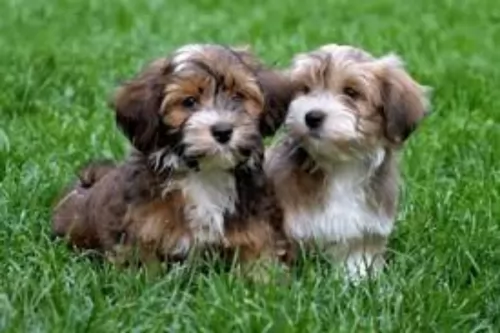 A very healthy breed, the Havanese doesn’t have a lot of health issues, but they are not immune to the problems of small breed dogs. The issues they do have are:
A very healthy breed, the Havanese doesn’t have a lot of health issues, but they are not immune to the problems of small breed dogs. The issues they do have are:
 Your GFB, with his shaggy coat, will need a brush a couple of times a week and nothing much more, being looked upon as a fairly low maintenance breed.
Your GFB, with his shaggy coat, will need a brush a couple of times a week and nothing much more, being looked upon as a fairly low maintenance breed.
He will require you checking inside his ears to ensure he is free of infection. You will need to have his nails trimmed if he doesn't wear them down himself and he will need to have his teeth brushed at least 2 or 3 times a week with special dog toothpaste- and toothbrush.
As a medium sized dog, the Griffon Fauve de Bretagne will need a high-quality dog food full of all the right vitamins and minerals to ensure health and a long life.
He is a hunting dog so you want to make sure that protein is listed high on the ingredients list of his food packaging. You can vary his diet by adding in homemade fare such as cooked chicken, rice and vegetables and you can also try to include some raw meat into his diet too. This raw meat plays an important role in preventing skin allergies.
Never leave him without a bowl of fresh, cool water.
Ensure your 4-legged friend has a nice dry, warm spot with clean blankets to sleep on.
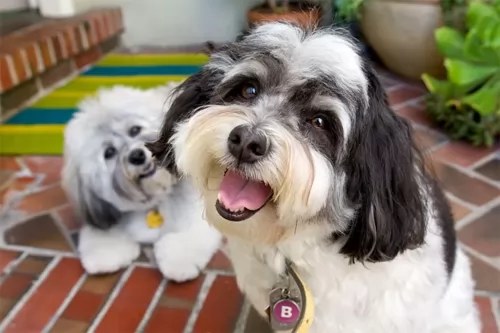 Feed 3 to 4 times per day a high quality dry puppy food for toy or small dogs. Feed ¼ to ½ cup each time.
Feed 3 to 4 times per day a high quality dry puppy food for toy or small dogs. Feed ¼ to ½ cup each time.
Remember these are small dogs and don’t overfeed. Feed a high quality dry food for small or toy dogs. Feed twice a day at about ½ cup each time.
The breed is generally very healthy.
This breed is not an overly active dog, but he does need some exercise. A nice walk once a day or a backyard to play in. They play inside as well as out. Don’t over exercise the Havanese. They do well in obedience and confirmation more so than agility or fly ball